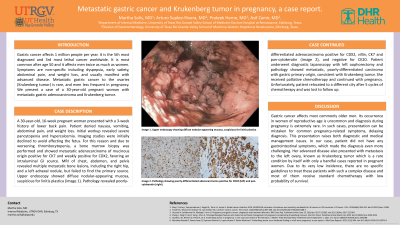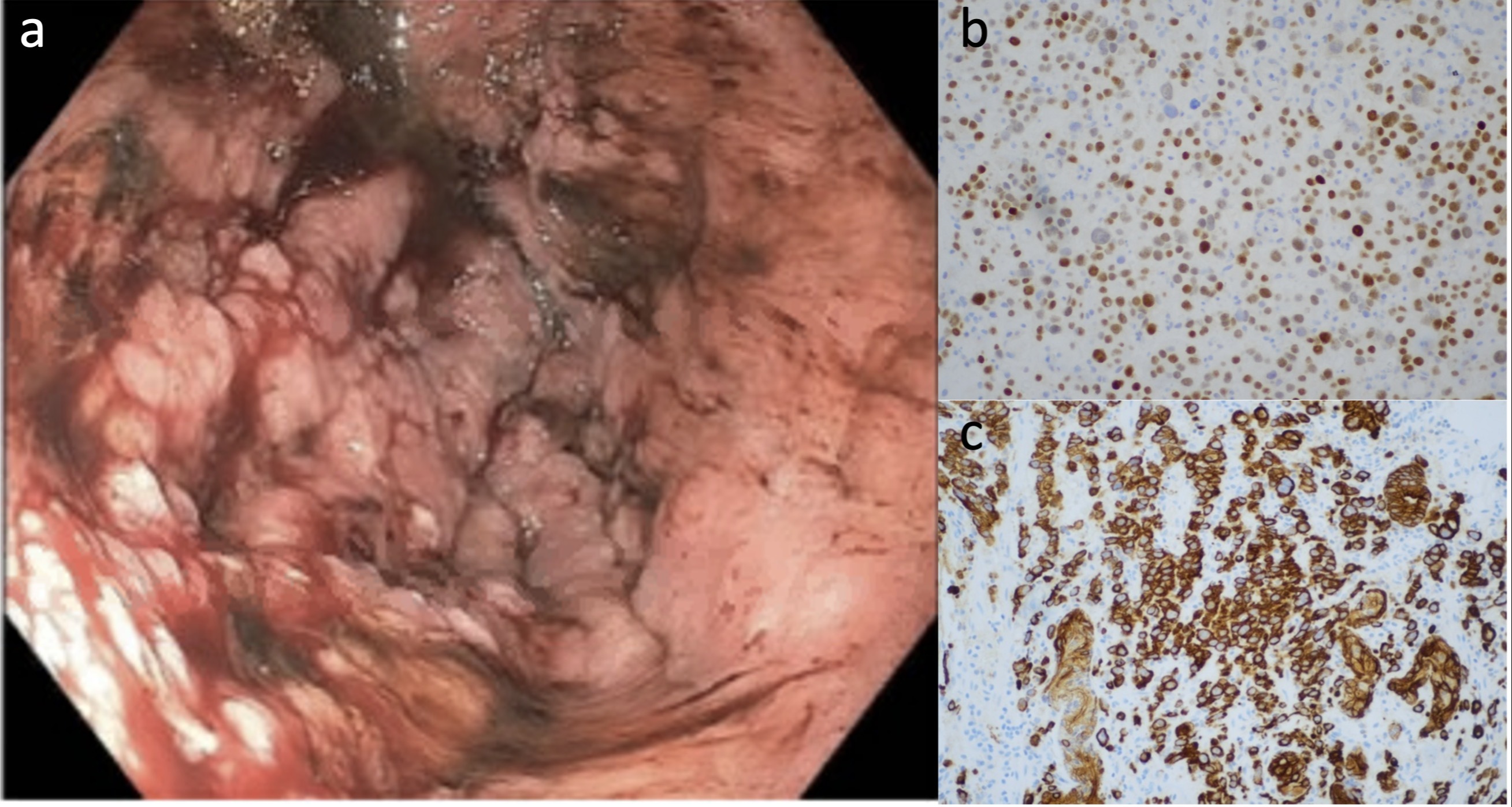Back


Poster Session E - Tuesday Afternoon
Category: Stomach
E0732 - Metastatic Gastric Cancer and Krukenberg Tumor in Pregnancy - A Case Report
Tuesday, October 25, 2022
3:00 PM – 5:00 PM ET
Location: Crown Ballroom

Has Audio

Martha M. Solis, MD
University of Texas Rio Grande Valley
Edinburg, TX
Presenting Author(s)
Martha M. Solis, MD1, Arturo Suplee Rivera, MD2, Prateek S. Harne, MBBS, MD2, Asif Zamir, MD, FACG3
1University of Texas Rio Grande Valley, Edinburg, TX; 2University of Texas Rio Grande Valley at Doctors Hospital at Renaissance, Edinburg, TX; 3Renaissance Gastroenterology at Doctor's Hospital at Renaissance, Edinburg, TX
Introduction: Gastric cancer affects 1 million people per year. It’s the 5th most diagnosed and 3rd most lethal cancer. It’s most common after age 50 and it affects men twice as much as women. Symptoms are non-specific including dyspepsia, early satiety, abdominal pain, and weight loss, and usually manifest with advanced disease. Metastatic gastric cancer to the ovaries (Krukenberg tumor) is rare and even less frequent in pregnancy. We present a case of a 30-year-old pregnant woman with metastatic gastric adenocarcinoma and Krukenberg tumor.
Case Description/Methods: A 30-year-old, 16-week pregnant woman presented with a 3-week history of lower back pain. Initial workup revealed severe pancytopenia and hypercalcemia. Patient underwent bone marrow biopsy showing metastatic adenocarcinoma of mucinous origin positive for CK7 and weakly positive for CDX2, favoring an intraluminal GI source. MRI revealed multiple metastatic bone lesions and a left adnexal nodule but failed to find the primary source. Upper endoscopy showed diffuse nodular-appearing mucosa, suspicious for linitis plastica. Pathology revealed poorly-differentiated adenocarcinoma positive for CDX2, villin, CK7 and pan-cytokeratin (image 1). Patient underwent diagnostic laparoscopy with left oophorectomy showing metastatic, poorly-differentiated carcinoma with gastric primary origin, consistent with Krukenberg tumor. She received palliative chemotherapy and continued with pregnancy. Unfortunately, patient decided to relocate to a different city after 5 cycles of chemotherapy and was lost to follow up.
Discussion: Gastric cancer affects most commonly older men. Its occurrence in women of reproductive age is uncommon and diagnosis during pregnancy is extremely rare. In such cases, presentation can be mistaken for common pregnancy-related symptoms, delaying diagnosis. This presentation raises both diagnostic and medical management issues. In our case, patient didn’t have any gastrointestinal symptoms, which made the diagnosis even more challenging. Her advanced disease also presented with metastasis to the left ovary, known as Krukenberg tumor which is a rare condition by itself with only a handful cases reported in pregnant women. Due to its very low incidence, there are no specific guidelines to treat these patients with such a complex disease and most of them receive standard chemotherapy with low probability of survival.

Disclosures:
Martha M. Solis, MD1, Arturo Suplee Rivera, MD2, Prateek S. Harne, MBBS, MD2, Asif Zamir, MD, FACG3. E0732 - Metastatic Gastric Cancer and Krukenberg Tumor in Pregnancy - A Case Report, ACG 2022 Annual Scientific Meeting Abstracts. Charlotte, NC: American College of Gastroenterology.
1University of Texas Rio Grande Valley, Edinburg, TX; 2University of Texas Rio Grande Valley at Doctors Hospital at Renaissance, Edinburg, TX; 3Renaissance Gastroenterology at Doctor's Hospital at Renaissance, Edinburg, TX
Introduction: Gastric cancer affects 1 million people per year. It’s the 5th most diagnosed and 3rd most lethal cancer. It’s most common after age 50 and it affects men twice as much as women. Symptoms are non-specific including dyspepsia, early satiety, abdominal pain, and weight loss, and usually manifest with advanced disease. Metastatic gastric cancer to the ovaries (Krukenberg tumor) is rare and even less frequent in pregnancy. We present a case of a 30-year-old pregnant woman with metastatic gastric adenocarcinoma and Krukenberg tumor.
Case Description/Methods: A 30-year-old, 16-week pregnant woman presented with a 3-week history of lower back pain. Initial workup revealed severe pancytopenia and hypercalcemia. Patient underwent bone marrow biopsy showing metastatic adenocarcinoma of mucinous origin positive for CK7 and weakly positive for CDX2, favoring an intraluminal GI source. MRI revealed multiple metastatic bone lesions and a left adnexal nodule but failed to find the primary source. Upper endoscopy showed diffuse nodular-appearing mucosa, suspicious for linitis plastica. Pathology revealed poorly-differentiated adenocarcinoma positive for CDX2, villin, CK7 and pan-cytokeratin (image 1). Patient underwent diagnostic laparoscopy with left oophorectomy showing metastatic, poorly-differentiated carcinoma with gastric primary origin, consistent with Krukenberg tumor. She received palliative chemotherapy and continued with pregnancy. Unfortunately, patient decided to relocate to a different city after 5 cycles of chemotherapy and was lost to follow up.
Discussion: Gastric cancer affects most commonly older men. Its occurrence in women of reproductive age is uncommon and diagnosis during pregnancy is extremely rare. In such cases, presentation can be mistaken for common pregnancy-related symptoms, delaying diagnosis. This presentation raises both diagnostic and medical management issues. In our case, patient didn’t have any gastrointestinal symptoms, which made the diagnosis even more challenging. Her advanced disease also presented with metastasis to the left ovary, known as Krukenberg tumor which is a rare condition by itself with only a handful cases reported in pregnant women. Due to its very low incidence, there are no specific guidelines to treat these patients with such a complex disease and most of them receive standard chemotherapy with low probability of survival.

Figure: Image 1. Upper endoscopy showing diffuse nodular-appearing mucosa, suspicious for linitis plastica (a). Pathology showing poorly-differentiated adenocarcinoma positive for CDX2 (b) and pan-cytokeratin (c).
Disclosures:
Martha Solis indicated no relevant financial relationships.
Arturo Suplee Rivera indicated no relevant financial relationships.
Prateek Harne indicated no relevant financial relationships.
Asif Zamir indicated no relevant financial relationships.
Martha M. Solis, MD1, Arturo Suplee Rivera, MD2, Prateek S. Harne, MBBS, MD2, Asif Zamir, MD, FACG3. E0732 - Metastatic Gastric Cancer and Krukenberg Tumor in Pregnancy - A Case Report, ACG 2022 Annual Scientific Meeting Abstracts. Charlotte, NC: American College of Gastroenterology.
